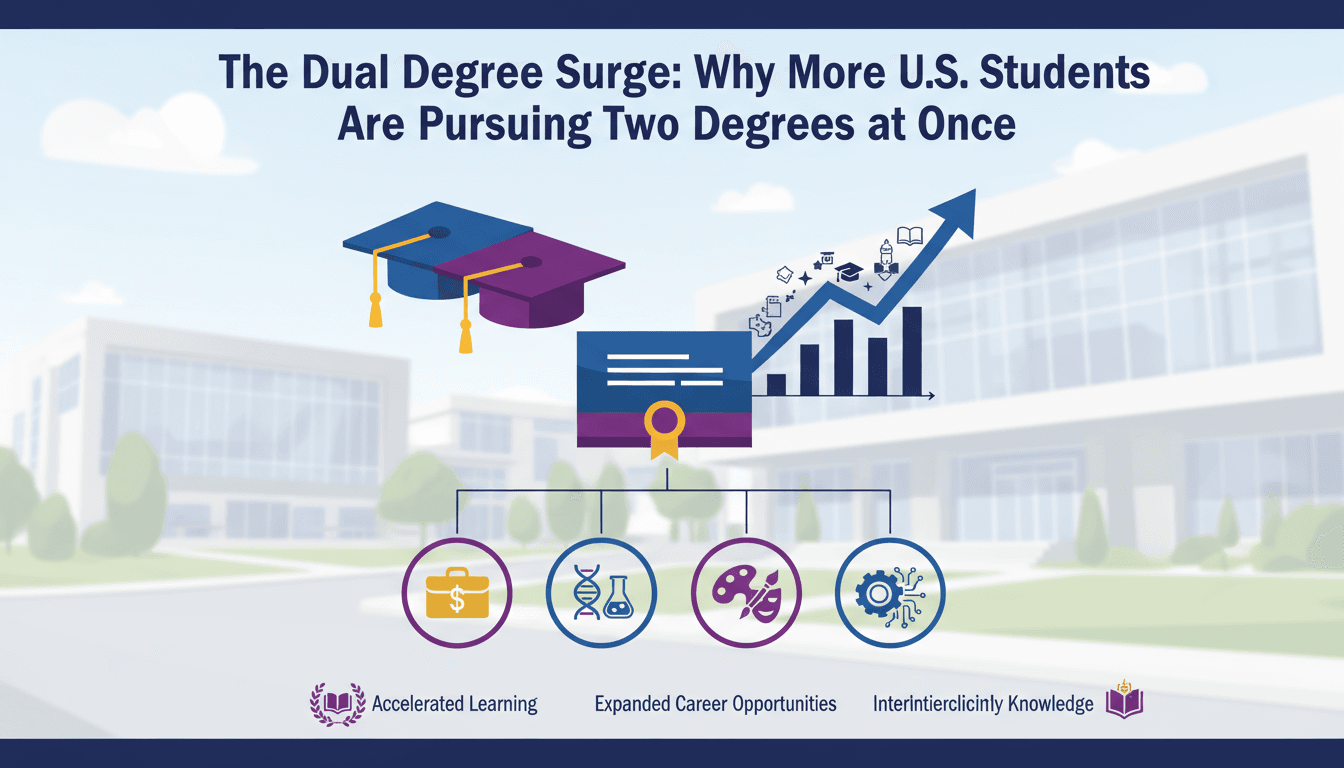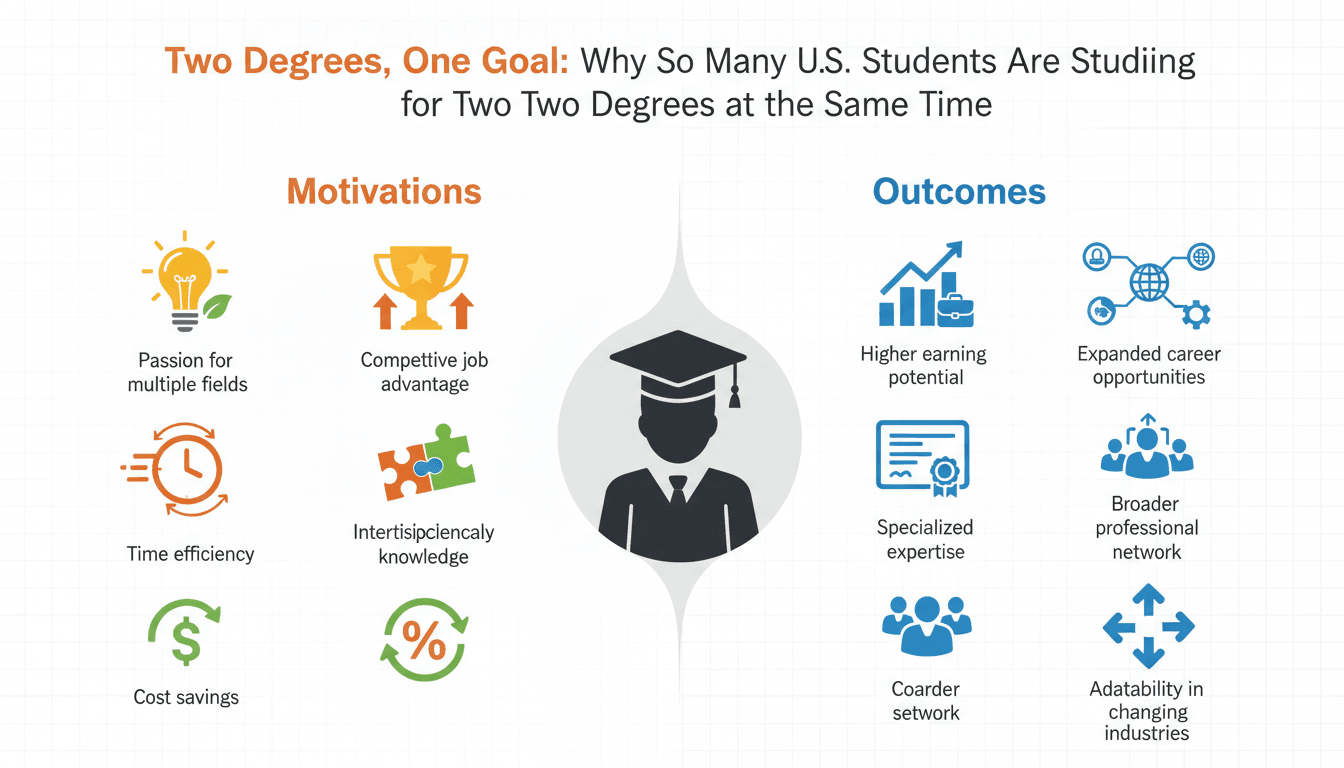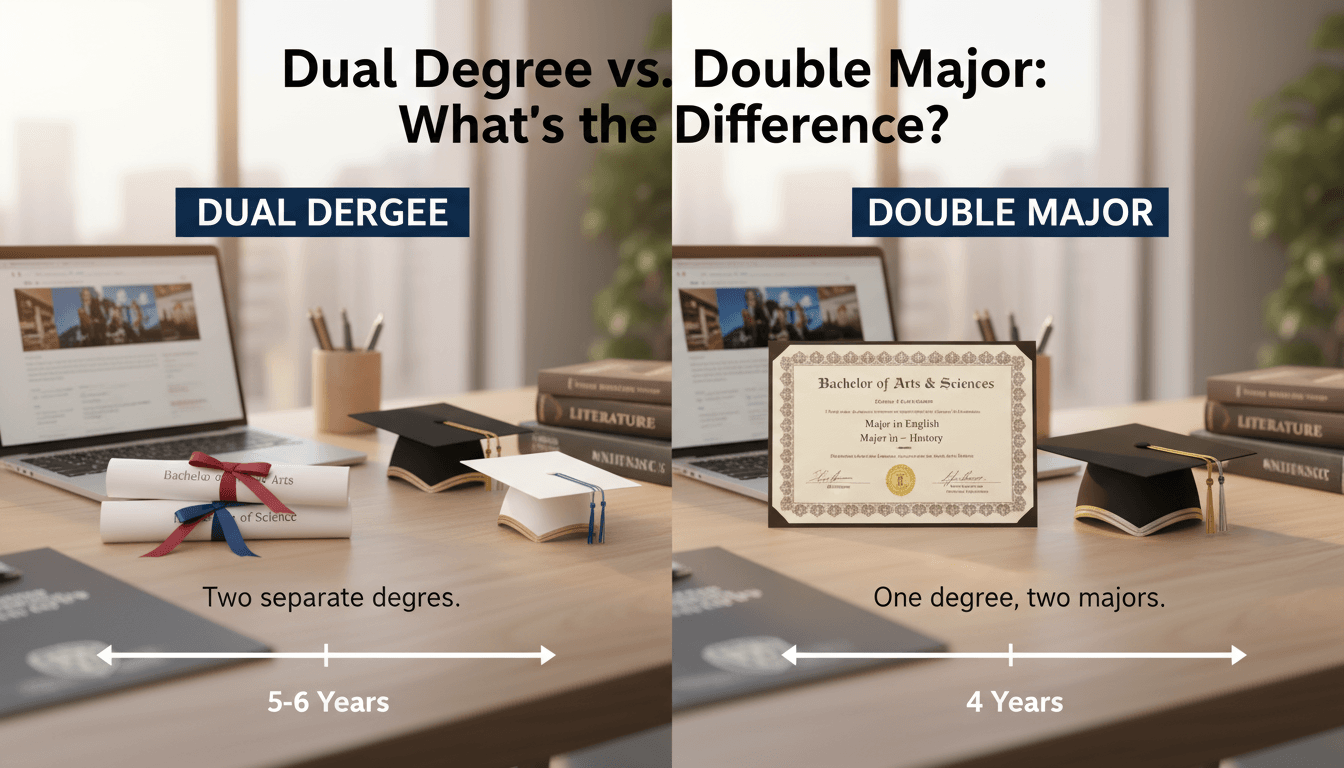Why So Many U.S. Students Are Studying for Two Degrees at the Same Time
The latest trend in US higher education shows a significant rise in students pursuing two majors or degrees simultaneously. This strategic academic choice is largely a direct response to anxiety over job security and the desire for a competitive edge in an increasingly volatile and skills-driven job market.

The Dual Degree Surge: Why More U.S. Students Are Pursuing Two Degrees at Once
The latest trend in US higher education shows a significant rise in students pursuing two majors or degrees simultaneously. This strategic academic choice is largely a direct response to anxiety over job security and the desire for a competitive edge in an increasingly volatile and skills-driven job market.
For students, this is a proactive way to "hedge their bets" and demonstrate a valuable breadth of knowledge.

Dual Degree vs. Double Major: What's the Difference?
It is crucial for students to understand the terminology, as the terms impact workload, time, and the final credential
Feature | Double Major | Dual Degree (or Concurrent Degrees) |
|---|---|---|
Credential | One Diploma/Degree (e.g., one B.A. or one B.S.) | Two Separate Diplomas/Degrees (e.g., a B.A. and a B.S.) |
Course Overlap | Requirements for the two majors often overlap, making it possible to complete both with a standard number of credits (e.g., 120-130). | Requires significantly more credits (often 150+), as fewer courses can overlap between two distinct degrees (like a Bachelor of Arts and a Bachelor of Science). |
Time to Complete | Typically finished within the standard 4 years. | Often requires 4.5 to 5 years due to the higher credit load. |
Common Pairings | Two related fields (e.g., Biology and Chemistry; History and Political Science). | Two distinct fields (e.g., a B.A. in English and a B.S. in Computer Science). |
What’s Happening Across U.S. Campuses
According to new reports, nearly one in three students at some American universities are now pursuing two majors or dual-degree programs.
Universities such as Harvard, NYU, and Wisconsin–Madison report a steady rise in double majors, especially in combinations like Computer Science + Business, Economics + Data Analytics, and Psychology + Neuroscience.
Institutions are making it easier through flexible credit systems, cross-department programs, and online hybrid courses, allowing students to finish two degrees in about the same time as one.
Dual-degree and interdisciplinary programs (such as Engineering + Management or Law + Public Policy) are particularly popular because they offer both technical and leadership training.How it happens :The mechanics behind of this
- You pick your primary major (say, Computer Science). Then you decide to add a second major (say, Data Science or Business) or even a second degree track.
- Many students use overlapping coursework: some required courses for major A also count toward major B, which helps.
- Because many U.S. institutions charge flat tuition per semester regardless of how many credits you take (within limits), adding a second major may not always cost much extra or lengthen your graduation time — if you plan well.
- Sometimes students enter college having already done advanced placement or dual-enrollment in high school. That gives them head-start credits, making it more feasible to finish two majors without extra years.
- Schools increasingly support these choices: for instance, programs where you can earn two bachelor’s degrees via partner institutions (one U.S., one abroad) are being expanded.
- are being expanded.

How US Students Pursue Two Degrees Simultaneously
Universities facilitate this trend through streamlined academic policies, especially for the more common double major.
1. Overlapping and Shared Core Requirements
- Most universities have a set of general education or "core" requirements (e.g., math, English, history) that all students must complete. For certain pairs of majors, these core requirements often overlap, allowing the student to use a single course to satisfy a requirement for both majors.
2. Strategic Course Planning
- Students must work closely with academic advisors from both departments from their first year. This planning ensures that they schedule the right sequence of courses to meet all prerequisites and complete all required classes within the standard eight semesters.
3. Leveraging Credits
- AP/IB Credit: Students who enter college with Advanced Placement (AP) or International Baccalaureate (IB) credits can often skip introductory courses, freeing up 6-12 credit hours to dedicate to the second major.
- Summer/Winter Courses: Some students choose to take one or two required courses during accelerated summer or winter sessions to lighten their load during the main academic year.
4. University-Designed Programs
- Many institutions now offer structured "integrated" or "4+1" programs that are pre-designed for two specific majors or for a bachelor's and a master's degree (B.S./M.S.), making the path clear and efficient.
The Trade-Offs: What Students Must Sacrifice (The Different Details)
1. The Opportunity Cost of Time
Reduced Internships: The heavy course load leaves less time and flexibility for meaningful, career-launching internships, co-ops, or study abroad programs. These real-world experiences can sometimes outweigh a second major in the eyes of an employer.
Limited Exploration: The schedule is rigid. There is little room for "discovery" electives—the classes that often spark new passions or lead to minors. Students are locked into a fixed plan, potentially missing out on a broader liberal arts experience.
2. Increased Risk of Burnout and Lower Grades
The GPA Challenge: Managing two sets of demanding upper-level course requirements, two sets of exams, and two separate capstone projects (the required final project for a major) significantly increases the risk of academic stress and burnout. For many competitive graduate programs and jobs, a high GPA in one major is preferred over a lower GPA in two.
Surface-Level Knowledge: Spreading focus too thin may result in the student graduating with a broad but shallow understanding of both fields, rather than the deep specialization employers may seek for highly technical roles.
3. Social and Financial Constraints
Less Free Time: The relentless academic pressure often translates to less time for extracurricular clubs, leadership roles, and social life, which are vital for developing essential soft skills like teamwork and networking.
The Extra Semester Threat: If a student miscalculates their courses and needs an extra semester (a 9th semester), they face a sudden, massive increase in tuition, housing costs, and lost income from delaying their professional career start.
Things students should consider (pros & cons)
Pros:
- You’ll stand out academically and professionally.
- Two majors means more options and flexibility for jobs or further study.
- If planned well, you might not graduate later than your peers.
- You can explore multiple interests.
Cons / caveats:
- More coursework = heavier workload, possibly less time for internships, extra-curriculars, student life.
- If the second major has little overlap, you may need extra semesters or pay more.
- Risk of spreading yourself too thin: don’t do a second major purely “because you should” — you need interest and capacity.
- Ensure both majors are well aligned with your career goals, not just a “nice to have” label.
Student FAQs: Making the Dual Degree Decision
FAQ | The Solution/Advice for Students |
|---|---|
Q1: Will a double major cost me extra tuition? | A: Usually not, as long as you complete both majors within the standard four years (eight semesters). US tuition is typically charged per semester or based on a credit range (e.g., 12-18 credits). If you take an extra semester, however, you will incur significant additional tuition and living expenses. |
Q2: Does taking two majors make college much harder? | A: Yes, the academic load is heavier. You have less time for electives and may have conflicting deadlines. This path demands superior time management and organizational skills. It often means less free time for extracurriculars, which is an important trade-off to consider for well-rounded development. |
Q3: Should I pursue two unrelated majors or two related majors? | A: Choose based on your goal. Unrelated majors (e.g., Music and Physics) offer the biggest "risk-protection" and career flexibility, as they diversify your skill set the most. Related majors (e.g., Journalism and Marketing) offer a deeper, more specialized expertise for a specific career niche. |

Conclusion
In an era of job market uncertainty and rapidly evolving industries, many U.S. students are choosing to pursue two majors (or dual degrees) as a way to future-proof their education, diversify their skills, and stand out. From a student’s perspective, it’s both an opportunity and a commitment. With thoughtful planning, support, and a clear strategy, doing two majors can be a smart move - but it’s essential to weigh the workload, cost, fit with your goals, and how you’ll use the two areas of study to build your career.
For more such information: https://www.onlyeducation.in/article
